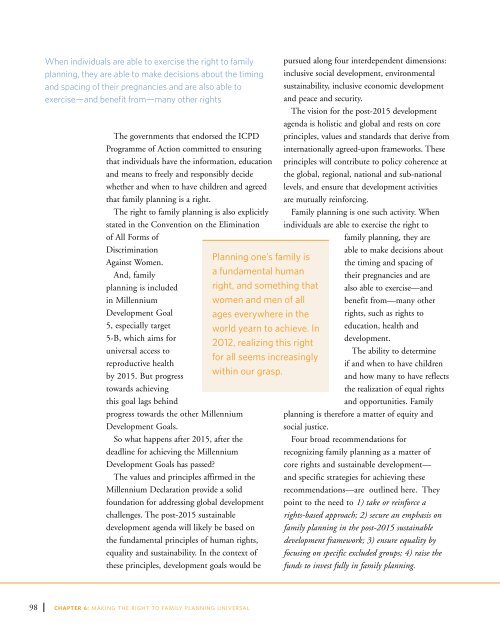State of World Population 2012 - Country Page List - UNFPA
State of World Population 2012 - Country Page List - UNFPA
State of World Population 2012 - Country Page List - UNFPA
You also want an ePaper? Increase the reach of your titles
YUMPU automatically turns print PDFs into web optimized ePapers that Google loves.
When individuals are able to exercise the right to family<br />
planning, they are able to make decisions about the timing<br />
and spacing <strong>of</strong> their pregnancies and are also able to<br />
exercise—and benefit from—many other rights<br />
The governments that endorsed the ICPD<br />
Programme <strong>of</strong> Action committed to ensuring<br />
that individuals have the information, education<br />
and means to freely and responsibly decide<br />
whether and when to have children and agreed<br />
that family planning is a right.<br />
The right to family planning is also explicitly<br />
stated in the Convention on the Elimination<br />
<strong>of</strong> All Forms <strong>of</strong><br />
Discrimination<br />
Against Women.<br />
And, family<br />
planning is included<br />
in Millennium<br />
Development Goal<br />
5, especially target<br />
5-B, which aims for<br />
universal access to<br />
reproductive health<br />
by 2015. But progress<br />
within our grasp.<br />
towards achieving<br />
this goal lags behind<br />
progress towards the other Millennium<br />
Development Goals.<br />
So what happens after 2015, after the<br />
deadline for achieving the Millennium<br />
Development Goals has passed<br />
The values and principles affirmed in the<br />
Millennium Declaration provide a solid<br />
foundation for addressing global development<br />
challenges. The post-2015 sustainable<br />
development agenda will likely be based on<br />
the fundamental principles <strong>of</strong> human rights,<br />
equality and sustainability. In the context <strong>of</strong><br />
these principles, development goals would be<br />
Planning one’s family is<br />
a fundamental human<br />
right, and something that<br />
women and men <strong>of</strong> all<br />
ages everywhere in the<br />
world yearn to achieve. In<br />
<strong>2012</strong>, realizing this right<br />
for all seems increasingly<br />
pursued along four interdependent dimensions:<br />
inclusive social development, environmental<br />
sustainability, inclusive economic development<br />
and peace and security.<br />
The vision for the post-2015 development<br />
agenda is holistic and global and rests on core<br />
principles, values and standards that derive from<br />
internationally agreed-upon frameworks. These<br />
principles will contribute to policy coherence at<br />
the global, regional, national and sub-national<br />
levels, and ensure that development activities<br />
are mutually reinforcing.<br />
Family planning is one such activity. When<br />
individuals are able to exercise the right to<br />
family planning, they are<br />
able to make decisions about<br />
the timing and spacing <strong>of</strong><br />
their pregnancies and are<br />
also able to exercise—and<br />
benefit from—many other<br />
rights, such as rights to<br />
education, health and<br />
development.<br />
The ability to determine<br />
if and when to have children<br />
and how many to have reflects<br />
the realization <strong>of</strong> equal rights<br />
and opportunities. Family<br />
planning is therefore a matter <strong>of</strong> equity and<br />
social justice.<br />
Four broad recommendations for<br />
recognizing family planning as a matter <strong>of</strong><br />
core rights and sustainable development—<br />
and specific strategies for achieving these<br />
recommendations—are outlined here. They<br />
point to the need to 1) take or reinforce a<br />
rights-based approach; 2) secure an emphasis on<br />
family planning in the post-2015 sustainable<br />
development framework; 3) ensure equality by<br />
focusing on specific excluded groups; 4) raise the<br />
funds to invest fully in family planning.<br />
98 CHAPTER 6: MAKING THE RIGHT TO FAMILY PLANNING UNIVERSAL
















